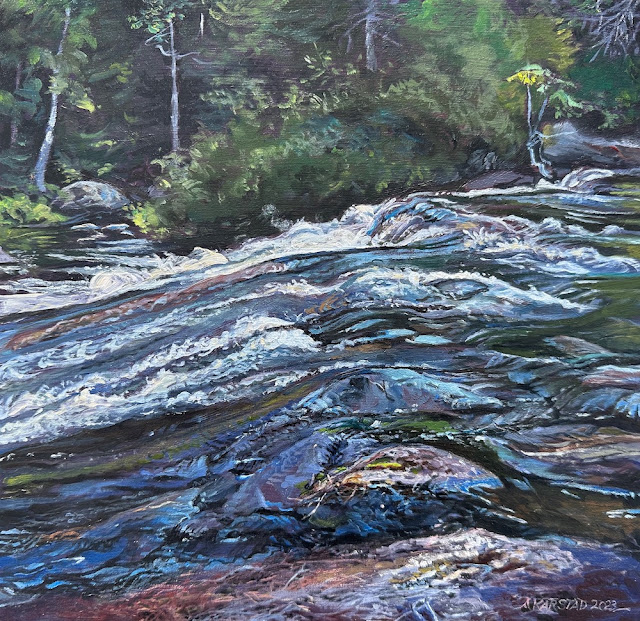Commanda's Teepee (oil on canvas 5 x 7 in.) Sold
5 August finds me at William Commanda's place at Kitigan Zibi on Anishinabi land near Maniwaki, Quebec, contemplating his old teepee on the shore of the Gatineau River. I am sitting against the back of his house, with a sunny expanse of lawn between me and the tent.
Retired Chief William Commanda, whom many unrelated people call Grandfather William, died on Wednesday. He would have turned 98 years old this fall. I had hoped to meet him here this weekend, at the "Circle of All Nations" gathering that he has hosted annually at his place. All nations are welcome, and I feel welcome too.
Commanda's vision was one of peace and reconciliation, respect for our history and for the natural world. It is a far-reaching vision, and will be carried on beyond him by those who consider him their spiritual leader, and those who respected him as a peacemaker and visionary. Many world leaders came to pay him their respects during his lifetime - including Nelson Mandela and the Dali Lama.
The thing that inspired my desire to meet him was his speaking about the importance of Eels in the ecology of North American rivers, and the importance of Ottawa Valley female Eels in the population of the whole northern hemisphere. He also expressed appreciation of Fred's poem about Eels
I came to attend William Commanda's funeral because I still want to meet the man. Returning from the cemetery, I notice a very large traditional canvas teepee that looks well used to being pitched beneath the trees by the river here. A pattern of branch shadows gracefully laces its canvas surface to the landscape. People are sitting in quiet conversation by its front door, the bright colours of their clothes in contrast with the blue of the river.
Perhaps this teepee was one of Grandfather William's favourite places, so I decide to paint it. This is a "place" that could be anywhere he wanted to pitch it - a place of tradition, yet adaptable to its environment. A place of shelter and privacy, yet hospitable and accommodating for friends and guests. A place of comfort in any weather - providing shade and cool breezes on hot days or the bright warmth of a fire on a cold night. It does not have a floor to collect the earth's dampness. The walls, doors, and hole at the top are all adjustable to control its internal climate.
I spent a night in one of the canvas teepees during a Bio-blitz last summer, and found the structure fascinating. That evening a migration of young Green Frogs came through the tent. They hopped in under the walls on one side, made their way around the fire which was glowing in the centre as several of us lay around on our sleeping mats, talking, and slipped out under the walls on the opposite side. Some of us felt ourselves being hopped upon! The next morning, we watched a Five-lined Skink moving about perfectly at home in and out of the chimney-like cone of the top of the tent.
The skin teepee (or "ti-pi"), the basis for this modern canvas model, originated with the plains tribes. Traditional Algonquin summer dwellings are "pikogan" made of posts covered with bark, with an opening at the top for air circulation, as in the skin or canvas teepee.
The large field at the entrance of Grandfather William's place is a patchwork of tents of all colours, shapes and sizes, but you can't have fires inside any of them - neither can they be comfortably shared with wild creatures! As I paint Commanda's teepee, and ponder the ancient designs for living on the earth comfortably and with a light footprint, I feel hopeful that our native peoples may help to guide "All Nations" to a sustainable future.
NOTE: Wikkipedia tells me that Kitigan Zibi (also known as River Desert, and designated as Maniwaki 18 until 1994) is a First Nations Reserve of the Kitigan Zibi Anishinabeg First Nation, an Algonquin band. It is situated at the confluence of the Désert and Gatineau Rivers, and borders south-west on the Town of Maniwaki in the Outaouais region of Quebec, Canada. Having an area of 175 square kilometres (68 sq mi), it is the largest Algonquin Nation in Canada, in both area and population."




your "last year" in the teepee with the Green Frogs and Skink would have been July 2009.
ReplyDelete